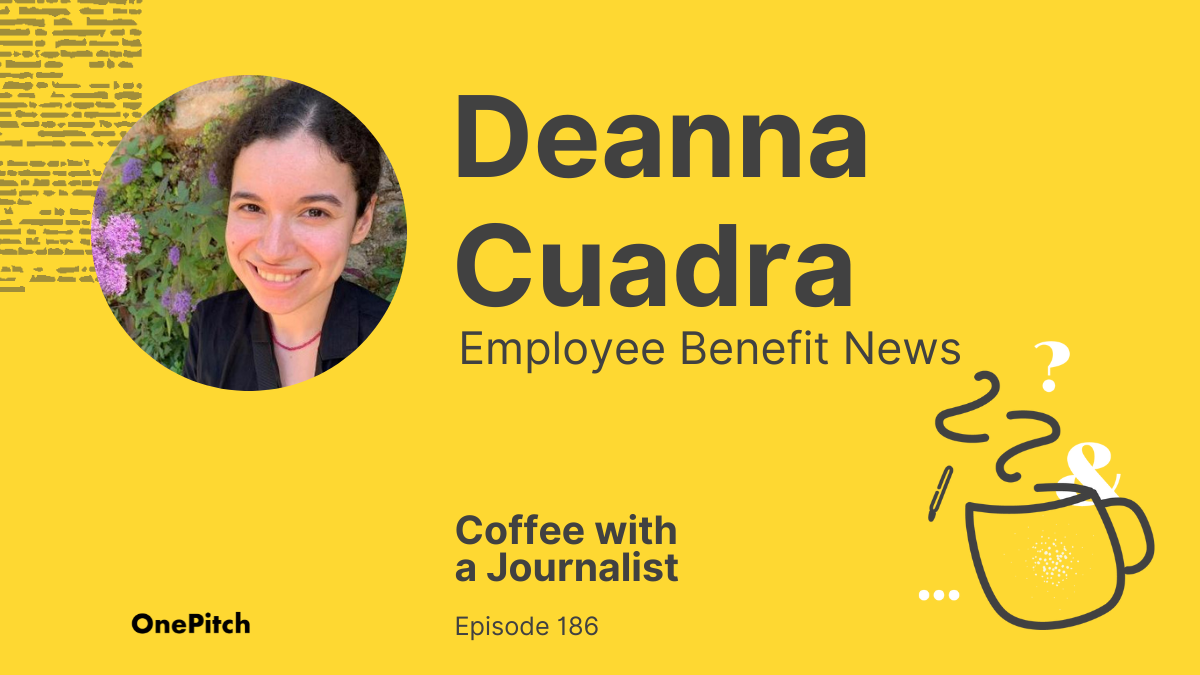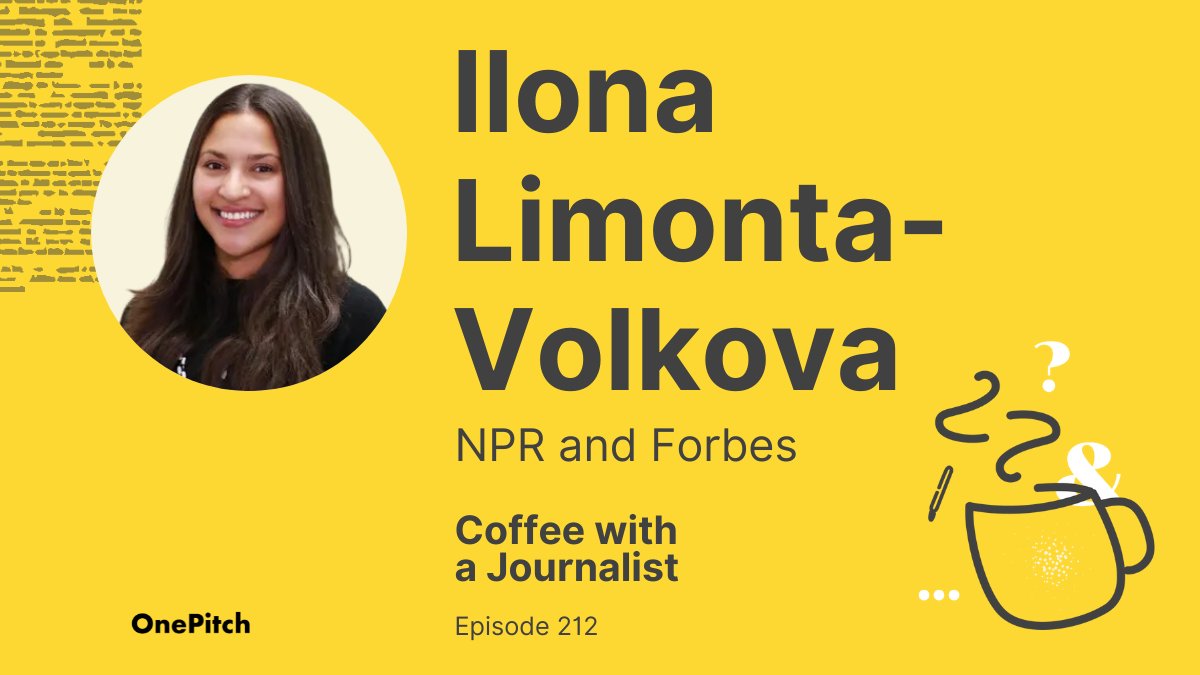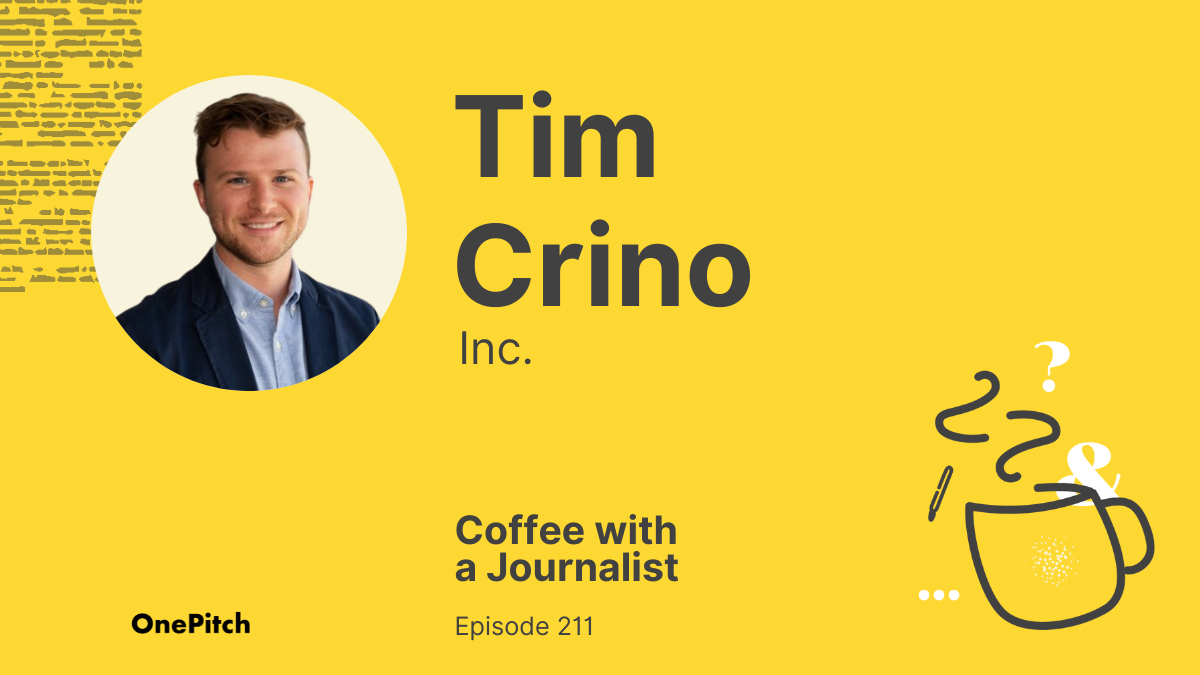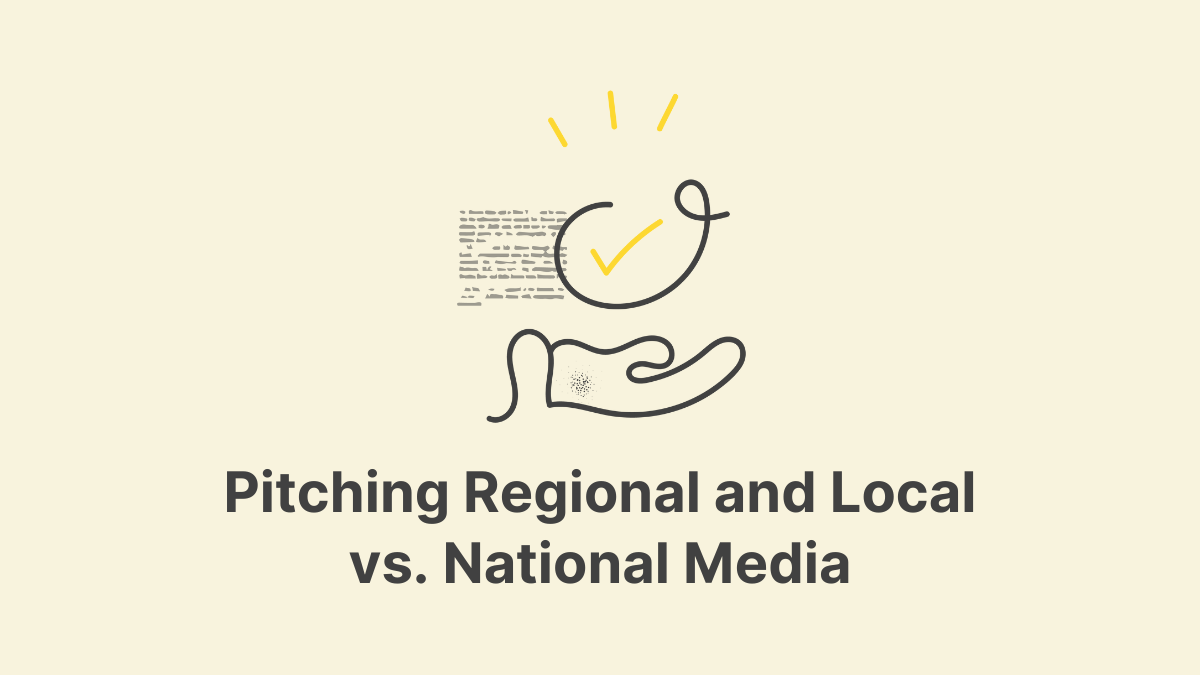Ilona Limonta-Volkova is the host of Money Memories, an NPR podcast, as well as a contributing...
×
Coffee with a Journalist: Deanna Cuadra, Employee Benefit News
- 10/3/2023
- OnePitch
- Media Insights
Deanna Cuadra is a senior reporter from Employee Benefit News, where she covers healthcare, US policy and reform, challenges faced by women and parents in the workplace, and innovation in work, culture, and, leadership. She also directs and produces short films and documentaries that center on marginalized communities.
During the episode, Deanna talks about her background in film and how it lends well to her
reporting, why it's important to include sources within your pitches, how many times you should
follow up with her, and more.
Follow her on Twitter and LinkedIn.
Click below to listen to the full conversation and read below for highlights from the interview:
The Significance of Subject Lines
[00:04:48] BB: You have to. You have to. Okay. Then it doesn't sound like you necessarily open
every email. You're just like, “Ah, I'm just looking at the subject line, and I'm moving from there.”
[00:04:57] DC: Yes. Sometimes, I can kind of just tell by subject line. I do try to read the ones
that even sound potentially like it could be relevant to me or someone on my team. But, yes,
subject line is huge, for sure.
[00:05:11] BB: Then tell us further. What's your subject line needs that you want to see?
[00:05:17] DC: Well, first, it's always helpful if I can tell from the subject line that it does touch
on something EBN covers. Not necessarily what I cover but –
[00:05:24] BB: Makes sense.
[00:05:25] DC: Just a topic that would be of interest to us. Yes. Of course, if there's a
recognizable name, whether it's the company or the source, that's always helpful to add. Bonus
points if that subject line can sort of hint at some sort of solution being offered. I think, especially
in healthcare news, you see a lot of negative news. So when something's being pitched where
there's a solution or expertise or advice, that catches my attention.
[00:05:54] BB: Okay. Expertise or advice, expand on that a little bit. Like from whom?
[00:05:59] DC: So they can either be in the benefit space. They can be someone who –
healthcare workers, of course, whether they're nurses, doctors, of course, in the healthcare or
tech space. So if you have a company that is working to be, let's say, a modern or an alternative
kind of benefits broker, or you're working to offer a solution, let's say, to provide healthier foods
and for preventative care. Things like that where there's – you're representing some side of the
healthcare experience, not necessarily just the traditional end of it. All of it's important, of
course.
[00:06:33] BB: Okay. Then do you have any like top pet peeves that you see in subject lines/
pitches? We’ll expand to that.
[00:06:41] DC: When it's a little bit – I guess when they're – it's definitely maybe just a me thing.
But maybe they're a little bit too on like the creative or salacious side, if that makes sense.
[00:06:52] BB: Like what? Like when you see like first ever Employee Benefit ever seen in the
world, and you're like, “Yes. No, that's not clearly –”
[00:07:01] DC: Yes. Or there's like emojis. Or they're referencing like something.
[00:07:05] BB: Wait, wait, wait. They have emojis in their pitch subject line.
[00:07:09] DC: Sometimes, yes. Listen, I love emojis.
[00:07:12] BB: Me too.
[00:07:12] DC: But I'm just not – it's not always like the best use of like that little bit of space
you get in the subject line.
[00:07:19] BB: Well, what kind of emoji do they use, though?
[00:07:21] DC: I honestly can't recall because it’s kind of just like a blur for me when I see like
the yellow colors. I'll be honest. Sometimes, I still click. But like it's just – again, it might be
better used to focus on like something a bit more critical you could tell me about the pitch.

Want to pitch Deanna and other journalists like her?
Click below to sign up for OnePitch and use these insights in your next pitch!

Ways to Ensure Your Pitch Stands Out
[00:08:02] BB: Exclusives or embargoes? Are those of interest to you perhaps?
[00:08:06] DC: Yes. I think me and my team are happy to receive them, as long as it just feels
relevant to what EBN covers. Ideally, in the perfect world, you would get them a week-ish in
advance. But I'm good with it being a few days before, as long as you have a source you can
jump on a call and offer a few comments, a few quotes on the topic.
[00:08:27] BB: Okay, a couple quotes, a couple comments. What's one of the best pitches
you've received and why?
[00:08:34] DC: Like the subject line?
[00:08:36] BB: Yes. Or just the whole process where you're like, “God, the subject line was on
point. I love the pitch. I did the interview. Oh, it was great.” Like you know what I mean?
[00:08:45] DC: Yes. One solid – I mean, there's been many. I think, in general, I'm pretty
fortunate with the pitches I received. But one that comes to mind is there was a pitch on, and
the subject line read as Deloitte analysis, all Americans can live longer and healthier, while
spending less on healthcare. That kind of tells you like right away this is touching on healthcare.
There's a solution being offered. There's expertise being offered. You jump into the pitch, and
you click, and you see that there's a bit of an intro to what this report's about, what about it
would be relevant to EBN, and then some bullet points on the data in the report.
Then, of course, it's always great to kind of end a pitch with, “I can connect you with so-and-so,
or I have a source or an author of the report who we can schedule an interview with.” So it's
always good to make sure you kind of make sure you say in your pitch like, “We do have
someone you can talk to.” Not just leave it with just the information.
[00:09:44] BB: Yes. So I want to call out a couple points on that, bullet points on the data,
emphasis on who they have for you to speak to. Then also, you mentioned something about
they mentioned why it's a fit for your outlet.
[00:09:58] DC: Yes. You don't have to be like, “This will fit your outlet because –”
[00:10:01] BB: Yes. A, B, and C. Yes. But you clearly picked that up from the yes. Yes. Okay,
very good. Anything else that you want to elaborate on in like terms of, “Oh, dang. Really good
pitch.”
[00:10:14] DC: I am a sucker for a good data point. So even if you're not pitching me a report or
necessarily research, if there's a data point that really drives home why that topic's important
and, of course, you cite it, that does help like capture my attention or at least like kind of tell me,
“Oh, okay. I need to like look into this or look more into that data.” It doesn't have to be your own
data. It can come from any reputable source. But I do like a number.
Rapid Fire Pitching Preferences
[00:12:37] BB: Yes. I like that positive energy. Okay, Deanna, we have a rapid-fire question
session here. Let us know your answers. Does that sound good?
[00:12:48] DC: Yes.
[00:12:48] BB: Okay. Video or phone interview?
[00:12:51] DC: I'm going to say video, but I feel fake for saying video because I usually do it
camera off. Like my connection is just bad, so – but for some reason, over the phone, the sound
quality is worse in my experience. I don't know why. I'll say video but like with an asterisk.
[00:13:07] BB: Okay, okay. Bullet points or paragraphs in the pitch?
[00:13:11] DC: Short paragraph in the beginning and then bullet points, as long as you want
them.
[00:13:17] BB: Short or long pitch that might tie directly to that?
[00:13:21] DC: Short in the beginning. You can go as long as you feel is necessary. Just try to
hook me in first.
[00:13:26] BB: Okay. Hook you first, which should come from the subject line and then expand
from there.
[00:13:31] DC: Yes.
[00:13:32] BB: Okay, very good. Now, images attached or Dropbox zip file?
[00:13:37] DC: Attached.
[00:13:38] BB: Okay, attached. Why is that, by the way? Everyone differs on this.
[00:13:41] DC: Maybe because I am just technologically not the greatest. Sometimes,
accessing those zip files or Dropbox, I especially can like need an account to open something.
So attached is usually easiest.
[00:13:55] BB: Okay, attached. Great. Oh, no. Email or Twitter DM or X, whatever we're calling
it?
[00:14:00] DC: Email, safest. Yes.
[00:14:02] BB: Yes. Safest. You're the second person this week who I've chatted with who's
like, “Oh, yes. People were sending me Gmail emails pitches from not a professional website
but just Gmail.” The person emphasized like, yes, it's a little bit of a digital safety issue and
things of that sort. So by the way, do people send you pitches through like a Gmail account?
[00:14:23] DC: It depends because sometimes I do get the opportunity to interview like
everyday workers who might not necessarily be communicating from their corporate account. I
love talking to people who are actually contributing every day to their workplace. So depending
on the context, it's fine. But if it's just kind of like a random pitch from like an unidentified
organization, that can be a red flag.
[00:14:47] BB: Okay. Got you. One follow-up or multiple?
[00:14:50] DC: I'll say up to three because I know that I can –
[00:14:53] BB: Up to three. Wow. Okay.
[00:14:54] DC: Up to three because I know that some days, I cannot look at my inbox. Either it's
just been a busy day or you're just a little bit burned out, and you can't start your screen
anymore. I know that in that case, I may have missed. I would say three is a safe number.
[00:15:12] BB: Okay, very good. Three. That's the top I've ever heard for this answer. Okay.
Direct or creative subject lines? We touched a little on that.
[00:15:21] DC: I just go direct.
[00:15:22] BB: Yes.
[00:15:22] DC: Yes. I go direct.
[00:15:24] BB: Just keep it straight. Okay. What time do you usually read pitches?
[00:15:28] DC: Let's see. I would say late afternoon. Towards the end of the workday is when I
kind of start glaring at my inbox to see what damage has been done.
[00:15:38] BB: Oh, what damage has been done. Okay. Then sources, you touched a little bit
on like, “Oh, people I could talk to.” But do you want to expand on like, “My favorite sources
are,” dot, dot, dot?
[00:15:49] DC: My favorite sources have been doctors, have been nurses. Even people in
academic spaces had some really insightful interviews. Of course, your c-suite folks are always
great, people who do work in, let's say, advocacy spaces, people who do work on political
reform. Non-profit organizations I've always enjoyed talking to. Yes. I think, ultimately, if you
have an experience that does relate to some bigger issues that are happening in the world of
labor, I think you have something valid to share, even if it's not necessarily a whole article.
[00:16:28] BB: But just commentary. Got it. Also, not on this little list but just to kind of wrap this
up before I ask you what other things you'd like to highlight or champion or whatnot. For the
federal level and legislative pieces that you do, which is quite a bit, as I'm looking through your
articles, where are your best sources from there? Are they in government currently? Are they in
maybe big NGO type of organizations?
[00:16:54] DC: I often talk to lawyers, and I talk to advocacy organizations. I'm open to having
more sources that are more within that government space. But when dealing with things like
compliance, when trying to figure out like what rules employers should be following, what things
they need to be careful of, lawyers can be a great resource. Of course, when thinking about,
let's say, if there's a policy that are impacting caregivers, talking to an organization like
MomsRising, which does focus on reform for families in the US, is also a great way of learning
more about the topic.
________
For more great 1:1 conversations with journalists from top-tier outlets, subscribe to the Coffee with a Journalist podcast to get the latest episode drops. Also, don’t forget to follow us on Twitter for other updates on our newest PR tips, tools, and best practices.
Want more tips from journalists?
Fill out the form below to subscribe to Coffee with a Journalist and receive weekly emails highlighting reporters, journalists, and editors and their individual pitching preferences.
Related Posts
Tim Crino is a senior editor at Inc. where his coverage focus is on cybersecurity and data privacy....
In the world of public relations, it’s no secret that tailoring your pitchrather than blasting out...
Newsletter Form
Recent Posts
About Us
OnePitch was created by a handful of
tech-savvy publicists and journalists
who believe that the PR industry is
long overdue for some innovation.
We’re changing this with OnePitch.







